Home / Degrees / Healthcare / Registered Nurse to Bachelor of Science in Nursing / Explore RN to BSN FAQ
FAQs About Online RN to BSN Programs

Many nurses enter the healthcare field by completing an associate degree or a hospital diploma program, then passing the NCLEX to become a registered Nurse (RN). While this is the quickest path to a career in registered nursing, it can also be the most limiting. Whether you are seeking a promotion or looking for a new job, the online RN to Bachelor of Science in Nursing (BSN) program from St. Thomas University (STU) can help you land new opportunities.
The American Association of Colleges of Nursing (AACN) reports that 69.8% of hospitals and healthcare employers now prefer to hire BSN-prepared nurses. One reason is that BSN RNs have additional knowledge in areas such as research and evidence-based practice. They also bring skills in care planning and coordination to their role, and they understand how to adapt best practices to a wide range of healthcare settings.
Online RN to BSN programs are designed to help busy nurses complete their degree while working full time. Courses are accelerated so students can move through material quickly, learn faster, and still have time for patients, friends and family. The questions below will help you learn more about the RN to BSN degree and the benefits of earning it online.
What Is an RN to BSN Program?
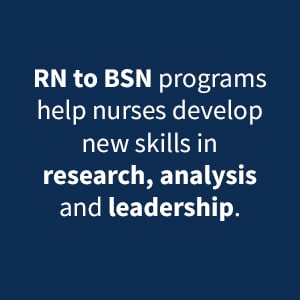
The RN to BSN degree is designed for working nurses who want to further their education and achieve their career goals. It is a bridge program that allows ADN- and diploma-prepared RNs to complete a bachelor’s in two years or less, depending on their previous course credits.
RN to BSN programs build on the foundational knowledge that experienced nurses bring to patient care. Students develop their skills in research, critical thinking, and analysis while gaining insight into new areas and aspects of nursing. According to AACN, RN to BSN programs also help nurses understand the cultural, political, economic and social issues that can affect health and patient care.
Online programs tend to be an affordable option for earning a BSN and the most flexible when it comes to scheduling. They can also save you time and money normally spent on commuting or finding childcare to study on campus.
St. Thomas University’s online RN to BSN program offers working nurses a convenient and affordable way to earn a bachelor’s degree. Study when and wherever it suits you, without disrupting your life in the process. Core nursing courses can be completed in as little as 12 months. You can also take most of the general education classes required for the nursing degree online.
Why Should I Earn a BSN If I Already Have an ADN?

A BSN can increase your skills and expertise in nursing and benefit your career. Expanding your knowledge of nursing practice to include advanced concepts in care delivery and advocacy can also help ensure the best results for your patients.
Studying evidence-based practice helps RNs understand the wide range of factors that contribute to acute and chronic disease, as well as short-term illness and overall health. You’ll also learn new strategies to promote wellness, improve communication and address nursing issues that can impact patient care.
A BSN can prepare you to take on many different leadership roles as well, or to work in specialized areas of nursing such as critical care or pediatrics.
The RN to BSN program at St. Thomas University empowers working nurses to deepen their clinical knowledge, expand into leadership and specialized roles, and elevate the quality of care they provide. Advancing one’s education through this program is an investment in professional growth, lifelong learning, and the future of nursing.
– Julie Menendez, Director of Online RN to BSN Program, St. Thomas University
Why Do Some Nursing Jobs Require a BSN?
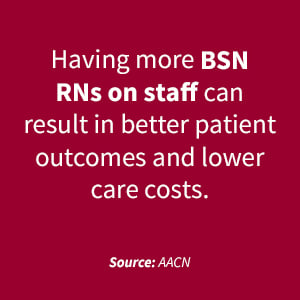
Over the last decade, hospitals and other healthcare employers have started following nursing recommendations originally issued by the Institute of Medicine (IOM), now known as the National Academy of Medicine. The push for more BSN-prepared nurses began in 2010, in response to the IOM’s research report The Future of Nursing. The report argued that the rapid evolution of healthcare in the U.S. calls for a higher minimum standard in nursing education. It suggested that 80% of RNs should be BSN-prepared by 2020.
According to the AACN, in 2024, enrollment in BSN programs increased by 4.9%. This adds over 12,000 new students, for a total of roughly 267,889 students, up from 143,294 in 2019. Multiple research studies conducted since the initial IOM report have also demonstrated that having more BSN-prepared RNs on staff can lead to a range of positive outcomes. They include fewer hospital-acquired infections, lower mortality rates, and decreased care costs due to shorter patient stays and fewer readmissions.
Do Magnet Hospitals Require a BSN?
Yes, most nursing positions do. BSN RNs are essential to hospitals and healthcare systems working toward Magnet designation from the American Nurses Credentialing Center. To earn Magnet status, institutions must strive to meet the IOM’s goal of 80% BSN-prepared RNs.
All nurse leaders must have a BSN as well. There are over 620 Magnet healthcare organizations across the U.S., with 25 located in Florida. Your BSN must also be accredited if you want to work for a Magnet hospital or system.
Do I Need a BSN to Become an APRN?
If you hope to be an Advanced Practice Registered Nurse (APRN) someday, you will need the academic and clinical preparation a BSN provides. It is the first step on the road to a Master of Science in Nursing (MSN). This master’s degree is required to become a nurse practitioner, nurse educator, clinical nurse specialist or any other type of APRN.
It is wise to earn your bachelor’s from an accredited nursing program if graduate school is part of your plans, because most MSN programs require an accredited BSN for admission.
What Will I Learn In an Online RN to BSN Program?
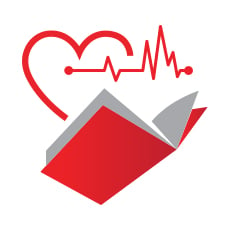
Online RN to BSN programs help nurses build on their core knowledge of patient care, develop their research skills and explore new ideas in the field. For example, when studying evidence-based practice, you’ll rely on your clinical experience as you do the following:
- Learn to gather information
- Make informed decisions
- Evaluate the results
Students also complete projects that address current issues in nursing, often in an actual healthcare setting. STU’s online students in the RN to BSN online program learn how to improve patient care using a variety of holistic assessment and support measures. Coursework highlights critical reasoning, collaboration and leadership, with a focus on strategic planning and innovation in nursing.
What Kind of Courses Will I Take In an Online RN to BSN Program?
You will complete both nursing and general education courses to earn a bachelor’s degree. BSN core classes cover subjects such as nursing research and advanced patient evaluation, as well as analytics and administration. They also provide students with a broader perspective on cultural and community issues that can impact health. The number of gen ed courses required will vary by student, based on previous coursework and transfer credits.
St. Thomas University’s online RN to BSN program requires 30 credit hours in nursing, completed in the following courses:
- Transition to Professional Nursing
- Health Care System Issues
- Nursing Research and Evidence-Based Practice
- Aging and the End of Life
- Health Assessment & Promotion
- Nursing Leadership
- Community Health Nursing
- Nursing Practice in Multicultural Society
- Nursing Informatics
In addition to the 24 general education credits required for the BSN, STU nursing students must take World Religions (3 hours) and Biomedical Ethics (3 hours) if they have not done so previously. Any classes not offered online at STU may be completed on campus or through a local community college.
Are There Any BSN Prerequisites?
Some online RN to BSN programs do require nursing prerequisites, usually for courses such as evidence-based practice. The type and number of classes you might need will depend on your school’s policies and degree requirements.
STU’s online RN to BSN program does not require any nursing prerequisites. You can begin taking BSN classes as soon as you enroll.
What is Accreditation?
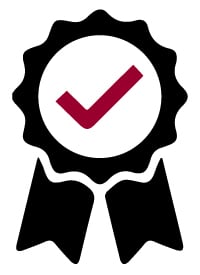
Accreditation is an independent review process that helps guarantee colleges and universities meet high academic and operational standards. It also ensures that schools provide students with the right preparation for their degree field.
Accreditors may evaluate universities or specific degree programs. They may look at policies, curriculum, finances, professor qualifications, teaching methods, learning resources, graduation rates and much more. Nursing program accreditors also consider student pass rates on the NCLEX and other RN licensure and certification exams.
Are Online RN to BSN Programs Accredited?
Most are, but not all. This is why it’s important to verify that your degree program is accredited before you apply. The U.S. Department of Education maintains a list of independent organizations that review nursing schools and the degrees they offer. You can also search the DOE Database of Accredited Postsecondary Institutions and Programs.
Online RN to BSN programs are typically accredited by either the Commission on Collegiate Nursing Education (CCNE) or the Accreditation Commission for Education in Nursing (ACEN). Once granted, accreditation must also be renewed every five years.
St. Thomas University’s online RN to BSN program is CCNE-accredited. STU is also regionally accredited by the Southern Association of Colleges and Schools Commission on Colleges (SACSCOC).
Why Is Accreditation Important?
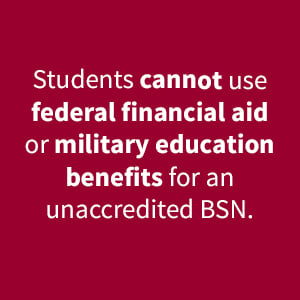
Accreditation helps ensure that schools and their degree programs operate responsibly and provide students with a quality education. Unaccredited schools do not always live up to these standards. Their graduates may also have limited job options in healthcare since most nursing employers expect BSN RNs to have an accredited degree. Magnet hospitals are among many employers that require one.
Nurses who study in unaccredited RN to BSN programs are not eligible for state or federal financial aid, and they can’t use military education benefits to pay for their degree. They also don’t qualify for federal loan consolidation, loan forgiveness or income-driven repayment programs after graduation.
For-profit colleges are more likely to be unaccredited than public or private universities. This may be one reason these institutions have higher rates of fraud and financial failure, as Ayelet Sheffey explains in a Business Insider article. All things considered, there is little benefit to earning your degree from an unaccredited nursing school.
Do Online RN to BSN Programs Have Clinicals or a Practicum?

Yes. Most online RN to BSN programs have a practice experience requirement, whether this educational component is known as clinicals, an internship or a practicum. You won’t repeat any elements of your original RN clinicals, however. The BSN version focuses more on research and evaluation, as well as other advanced concepts in nursing. Requirements differ by program, and each state also has its own standards for BSN preparation.
Students in STU’s online RN to BSN program complete their clinical requirements in two practicum courses: Nursing Leadership and Community Health Nursing. Each requires 54 clinical hours, divided between in-class learning and on-site application.
Clinical projects are tailored to each healthcare setting, with the goal of identifying issues and solving problems. Students also collaborate with nursing leaders, staff members, and the local community while working closely with professors and preceptors.
Will I Choose My Own Clinical Site and Preceptor?
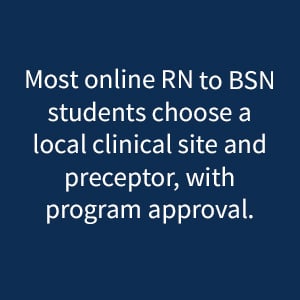
In most cases, yes. However, check with the programs you are interested in for their policies. Online RN to BSN students usually pick a site for their clinical practicum and are responsible for finding their own preceptor. In each instance, your arrangement must be approved by the professor or RN to BSN program coordinator overseeing your placement.
This approach to clinicals makes it easier for RNs to fit the required hours around their weekly nursing schedule. You can also choose the best placement for your needs and interests, as well as your career ambitions. Some schools provide placement assistance to RNs who are having difficulty finding the right fit, but it’s always best to confirm this before enrolling.
St. Thomas University strongly encourages online RN to BSN students to secure their own site and preceptor. Help is also available if needed, with the caveat that limited placement options may require commuting within your geographic area. Visit the courses section of the program page to learn more.
Can I Do My Clinicals In My Current Unit, or With My Regular Supervisor?
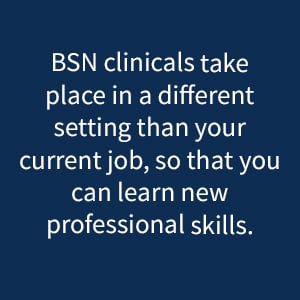
Probably not. Most schools don’t offer this option because the point of BSN clinicals is to broaden your knowledge and skills. While completing clinical hours in your regular job setting may seem convenient, it’s not the best way to get exposure to the new ideas, challenges and colleagues that can speed your professional development.
STU requires that online RN to BSN students complete their clinicals in a different setting than the one where they currently work. They should also work under a preceptor who is not their current supervisor.
For the leadership practicum, you could do a nursing project in another unit of your hospital or at a separate facility in your healthcare network. For the community health practicum, you will select a project site in your city or metro area and address issues impacting local citizens. You might team up with a nonprofit serving a specific patient population or work with your municipal health department.
Student practicum activities must also take place outside of typical working hours. This separation of duties is crucial because RNs cannot receive payment for time spent meeting clinical requirements for the degree.
What Are the Admissions Requirements for Online RN to BSN Programs?

Most online RN to BSN programs have similar admission requirements, which include:
- A valid RN license
- An associate degree or diploma program certificate
- Official transcripts from each school attended
- A grade point average (GPA) that meets the minimum standard for admission
Applicants to St. Thomas University’s online RN to BSN program must have a valid and unencumbered RN license as well as official transcripts documenting their RN preparation. A cumulative GPA of 2.5 on previous coursework is also required for admission.
Will My Previous Course Credits Transfer?
Transfer credit guidelines will vary by school, but most online RN to BSN students receive a substantial block of course credit for passing the NCLEX exam and/or having an RN license. You may be able to transfer some general education credits from a previous school as well, depending on the type of courses you’ve taken. Check with individual nursing programs to verify their policies.
Online RN to BSN students at STU are awarded 60 course credits in nursing for having their RN license, which is half of the 120 credits required for the degree. Students must complete their 30 BSN credits in the online program but may transfer in some general education courses if desired. Contact an STU online RN to BSN admissions advisor at 855-215-4021 for further information.
When Can I Enroll in an RN to BSN Program?
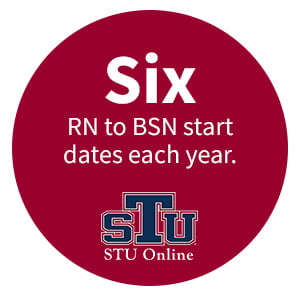
Traditional on-campus programs usually have one application date each spring and fall, but online programs are more flexible. You can apply online anytime, instead of waiting months for a new term to begin. Once you are accepted, you can also get started right away.
STU’s accelerated online RN to BSN program has six start dates a year. This means you can pursue your degree as soon as you’re ready.
What Is the Career Outlook for BSN RNs?

There is a continuing high demand for RNs in the decade ahead, with expected job growth of 6% through 2033, according to data from the U.S. Bureau of Labor Statistics (BLS).
BLS predicts faster-than-average job growth for RNs across America, which is attributed to this robust employment outlook due to an increase in both preventive care and chronic disease rates. The number of Baby Boomers who are at or nearing retirement age is also a contributing factor, because this group’s life expectancy continues to grow.
Spotlight: Why BSN RNs Win More Nursing Jobs

Bachelor’s degree RNs continue to stand out in today’s competitive healthcare job market. Top organizations, including the U.S. Veterans Administration, the nation’s largest nursing employer, require a BSN for RNs to advance beyond entry-level roles.
Workforce surveys and recent studies, including the AACN and Research in Nursing and Health articles referenced below, reveal that hospitals prefer to hire and promote BSN-prepared nurses, due to their proven impact on patient safety, improved outcomes and higher standards of clinical care. BSN RNs also benefit from greater career mobility and higher average salaries, outperforming their peers with associate degrees in both job opportunities and advancement.
Here’s what sets BSN-prepared nurses apart from their ADN peers:
- Greater career advancement: The U.S. Veterans Administration requires a BSN for RNs to move into leadership or specialty roles. ADN-prepared nurses often face advancement barriers within this federal system.
- Improved patient outcomes: Hospitals that increase their proportion of BSN nurses report lower patient mortality, fewer readmissions, and shorter hospital stays. A 10% increase in BSN nurses can lower mortality rates by more than 10%.
- Higher employer preference: As of 2025, nearly 70% of hospitals and healthcare organizations prefer to hire BSN-prepared nurses, per the AACN.
- Stronger earning potential: BSN RNs earn, on average, $17,000 more per year than ADN-prepared nurses.
Simply put, employers know that nurses with a bachelor’s degree have professional skills that set them apart.
Will I Make More Money With a BSN?
According to the latest BLS data linked above, the average salary for registered nurses is $93,600 annually. While pay can vary depending on your experience, region and job title, BSN RNs usually make more than nurses without a bachelor’s degree.
The table below features typical compensation rates for RNs in Florida. In many cities, BSN-prepared nurses earn at least $6,000 more annually. That’s an extra $43,500 in just seven years.
| Location | Average Annual Salary BSN RNs | Average Annual Salary All RNs |
|---|---|---|
| West Palm Beach | $85,358 | $76,816 |
| Miami | $97,809 | $84,040 |
| Fort Lauderdale | $85,088 | $83,711 |
| Jacksonville | $83,966 | $81,490 |
| Tampa | $83,767 | $83,036 |
| Orlando | $83,969 | $82,026 |
| Fort Myers | $95,449 | $82,012 |
| St. Petersburg | $96,699 | $83,087 |
| Tallahassee | $96,699 | $83,087 |
Source: ZipRecruiter, July 2025
Which BSN RN Jobs Pay the Best?
In addition to building new knowledge, BSN courses prepare RNs to step into more complex nursing and leadership roles. If you’re currently a nursing manager, the degree can also give you the credentials you need to get promoted or improve your salary. Of course, as with all salaries, they will vary. Holding a BSN can lead to a higher salary over time as well as unlock potential roles.
Here are a few of the great-paying jobs you can explore as a BSN RN.
| Position | Average Annual Salary |
|---|---|
| Informatics Nurse | $98,409 |
| Critical Care RN | $94,610 |
| NICU Manager | $127,391 |
| ER Nurse Manager | $86,737 |
| Clinical Operations Manager | $98,039 |
| ICU Nurse | $85,205 |
| Transplant Coordinator | $99,592 |
| Operating Room Nurse | $129,668 |
Source: ZipRecruiter, July 2025
At St. Thomas University, we are committed to preparing leaders, giving you the knowledge, the ethical background that you need so that you can be a true leader to your community.
– Pauline Louis, Instructor, St. Thomas University Online RN to BSN Program
What Are Some Advantages of Working at a Magnet Hospital?
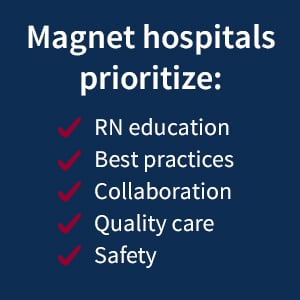
According to AACN, the Magnet designation is the gold standard in nursing. It recognizes healthcare institutions committed to excellence. Magnet hospitals promote best practices in management and patient care. They are also committed to RN training and development. Here are a few more reasons why working for one is a great career move:
- Your current skills will be validated: Magnet facilities are among the most selective in hiring nursing staff, and their RNs are well-regarded professionally. They also tend to have higher employee satisfaction and lower turnover rates.
- You’ll practice nursing in a setting focused on collaboration and quality of care: Research routinely links Magnet hospitals with better patient satisfaction and safety, including lower mortality rates and fewer pressure ulcers and falls.
- Statistics show that RNs are often safer on the job at Magnet facilities: AACN notes that nurses experience fewer musculoskeletal issues, accidental needlesticks and other injuries.
Nurses hoping to join the staff at a Magnet hospital are in the best position to do so after earning a BSN. Some hospitals will also hire qualified ADN-prepared nurses enrolled in an RN to BSN program.
How Long Does It Take to Earn a BSN Online?
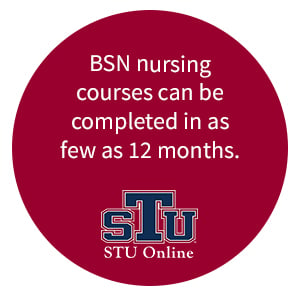
You can complete online RN to BSN programs in as little as two years, because they build on past experience and previous courses. Most programs award incoming students substantial course credit for passing the NCLEX and holding an RN license, so everything you’ve learned can also count toward your bachelor’s. Once you enroll, your pace will likely depend on:
- Your schedule
- The amount of time you devote to school
- Total number of nursing and general ed credits required for the degree
The nursing component of STU’s online RN to BSN program can be completed in just 12 months by taking two classes each term. This timeline is for BSN courses alone and does not include any general education requirements you may still need to meet.
How Many Hours Will I Need to Study a Week?
If you set aside nine to 12 hours of study time per class each week, you should be able to complete everything your professor has assigned. However, adjust this figure according to your study habits, and give yourself more time whenever assignments or projects are due.
Can I Go to School and Work Full Time?

Yes. Online RN to BSN programs are tailored to working nurses and consider their needs and circumstances. You can study whenever it’s convenient, whether that’s on a lunch break, on your day off or at night after the kids are in bed. You can even listen to your professor’s lectures on the way to work or while stuck in traffic. Your virtual classroom is available wherever you go.
STU’s accelerated seven-week courses give students the flexibility to fit school around work or family obligations. While earning a BSN can be challenging, online study makes it possible for RNs to enjoy all the benefits that come with a bachelor’s degree.
How Much Does an Online RN to BSN Program Cost?
The average cost to complete all required nursing courses ranges from about $10,000 to $15,000. The cost of an online RN to BSN degree can vary for each student depending on a few factors. Where you live is sometimes most important because that may determine whether you’ll pay in-state or out-of-state tuition. Many online nursing programs charge all students the same tuition rate, but this is not always the case. Tuition for STU’s RN to BSN online program is the same for in-state and out-of-state students, and students can also pay by the course.
The number of courses you’ll need to take is the next consideration. Aside from your BSN classes in nursing, consider the general education credits you have left to complete. Check whether you have to fulfill prerequisites as well. Once you know how many hours are required to finish your degree, you can figure out your tuition cost. Don’t forget to add any fees that may also apply.
Will My Employer Pay for My BSN?
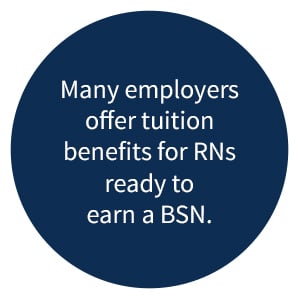
A number of hospitals and healthcare systems provide tuition reimbursement for nurses as part of their standard employee benefit package. Sometimes it is also offered as an incentive for ADN and diploma-prepared nurses to further their education. Check with your employer, however, as these programs are not standard in every workplace.
If you are changing jobs and considering a BSN, be sure to ask potential employers whether tuition reimbursement is an option. Many hospitals competing for the best nurses are now including this benefit in their recruiting package, along with signing bonuses and other perks.
Are Online Students Eligible for Financial Aid?

Online students attending an accredited school or degree program can apply for federal student aid, including loans, grants and scholarships. Your eligibility will depend on your income, the cost of your degree and other criteria. The first step is to submit the Free Application for Federal Student Aid (FAFSA) by your online RN to BSN program’s established deadline.
The federal Nurse Corps Scholarship and Loan Repayment programs also provide assistance to RNs willing to make a service commitment after graduation and work in a high-need facility or geographic area. The Florida Nurses Association (FNA) offers a list of nursing scholarships online that students can apply for.
Can I Use My Military Education Benefits for an Online RN to BSN Program?

Yes, as long as the degree program you choose is accredited. Funding programs available through the U.S. Department of Veterans Affairs include the Post-9/11 GI Bill, Montgomery GI Bill (Active Duty and Selective Reserve) and Survivors and Dependents Educational Assistance.
St. Thomas University also participates in the VA’s Yellow Ribbon Program, which helps fill funding gaps for service members without enough coverage under the Post-9/11 GI Bill.
Are Online Courses Easier Than Courses On Campus?
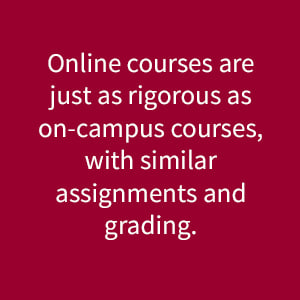
No. Online courses require the same time commitment and hard work as classes held on campus. The readings, assignments and grading policies will be similar in each version, and you’ll be learning the same skills and concepts.
In fact, online nursing courses are often taught by the same professors you would study with on campus. The main difference you’ll notice is that learning online makes it easier to balance professional and personal commitments while earning your degree.
How Do Online Courses Work?
Online courses are organized to help you move through lessons quickly and independently, even if you’ve never studied this way before. Each course features a syllabus, a schedule and a set of learning modules. You will find readings and assignments to complete, along with guidelines and due dates. Professors’ lectures are recorded on video, so you can watch them at any time. You’ll also take tests and submit papers in your online course.
Simply log in to your school’s learning management system (LMS) to find your classes and begin earning your degree. St. Thomas University’s Canvas LMS is user-friendly and easy to navigate, with courses, grades and helpful learning resources all located in one convenient place.
It is imperative that students dedicate the time to meet all their requirements. It is important to be engaged in the class and participate in discussions. It is essential to keep good communication with your instructor to facilitate your needs.
– Cassandre Milien, Clinical Coordinator, St. Thomas University Online RN to BSN Program
Will I Have Classmates in Online RN to BSN Courses?

Yes. There are plenty of opportunities to interact with other students in your online courses. You can even work and study with your RN peers.
Discussion board conversations give students the chance to share experiences and hear different perspectives on nursing. Group projects and presentations allow RNs to collaborate and do research together. You can also communicate with classmates at any time via email or chat with them online.
What Are the Technology Requirements for Online Courses?

Studying online isn’t nearly as complicated as it may sound. To get started, you need a computer, internet access, word processing software, and enough storage space for assignments and other files. If you already stream videos and chat online, you are probably ready to do the same in your classes. Submitting homework and papers is easy as well.
If your computer is older and you feel you need a technology update, it’s possible to get a new laptop or desktop system without breaking the bank. Your current setup may also be fine with a few upgrades. You can even use a smartphone or tablet as needed when posting to discussion boards, watching video lectures or talking to your professor.
Check with the nursing programs you are interested in to learn more about tech requirements for their LMS and online courses.
What Kinds of Support Services Are Available to Online Students?

Online students are eligible for many of the same services as on-campus students to create an ideal learning environment. The type of services available will vary by school, but remote library access and tech support are common forms of assistance.
STU offers extensive student services online. The University Library provides e-books and online databases, as well as research assistance via telephone or email seven days a week. You can even use the interlibrary loan service online, or get a book delivered if you live within 100 miles of campus. The Glenn Hubert Student Learning Center offers 24/7 writing support, and Office of Information Technology (OIT) Help Desk services are available around the clock.
Spotlight: Community Nursing Projects Help Floridians Make Healthy Choices
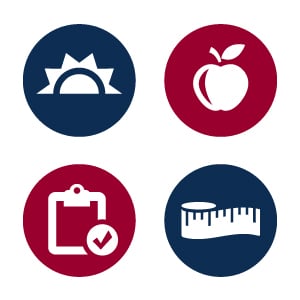
BSN RNs play a vital role in public health projects that address community needs. The Florida Department of Health oversees many of these efforts in the Sunshine State. It introduced a wide range of disease prevention and awareness activities, including a number of projects designed to address the issue of obesity.
Carrying extra weight can lead to premature death as well as conditions such as high cholesterol, hypertension, diabetes and heart disease. Using evidence-based practice, BSN RNs can find the best strategies for helping patients adopt healthy diet and exercise habits. They can also make a difference by participating in obesity outreach campaigns targeted to youth and adults.
According to the Department of Health, 66.1% of adult Floridians are overweight or obese. The state also predicts that 60% of Florida children will be obese by the time they graduate from high school. Some government agencies in the state have partnerships with universities and healthcare providers to try and reverse these concerning trends.
For example, Jackson County’s Community Health Improvement Plan (CHIP) has several key obesity-related initiatives. They include strategies to increase physical well-being, encourage consumption of fruits and vegetables and help reduce chronic disease rates linked to unhealthy weight. All of these contribute to a longer lifespan.
Online RN to BSN students at STU interested in public health have the opportunity to get this type of hands-on community nursing experience during their bachelor’s practicum. Obesity is just one challenge among many important health issues nursing students can choose to address in their city or region.